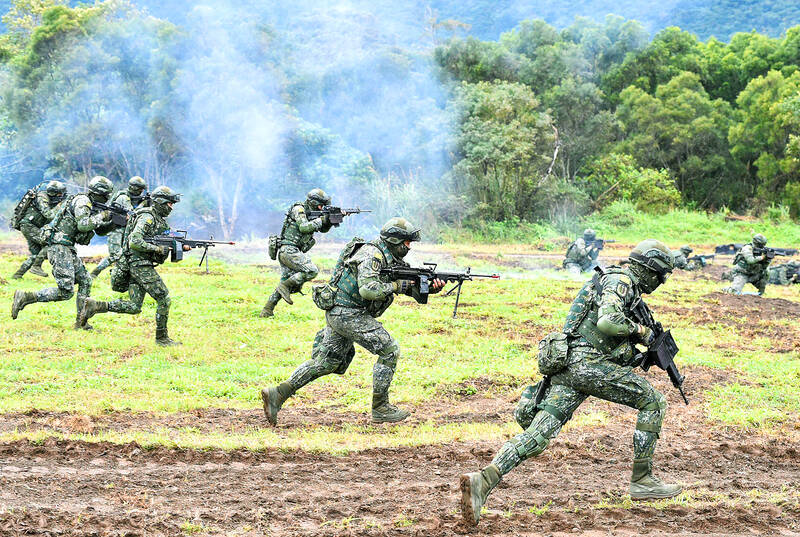A military crisis in the Taiwan Strait that would involve the US was ranked as a “Tier 1” contingency, the results of the Preventive Priorities Survey released by the Council on Foreign Relations think tank showed on Wednesday.
Tier 1 contingencies should be given a top priority when Washington this year makes efforts to prevent potential conflicts, the US think tank said.
The likelihood of “an escalation of coercive pressure by China toward Taiwan, including heightened military activity, precipitates a severe cross-strait crisis involving the United States and other countries in the region” was “moderate,” but it would have a “high” impact on US interests, the survey said.

Photo: AFP
The council first included the possibility of a Taiwan Strait crisis as a “Tier 2” contingency in 2019, reclassifying it as Tier 1 in 2021.
With most Tier 1 contingencies concerning potential flashpoints involving the world’s superpowers, the risk of the US becoming embroiled in a military confrontation with China or Russia, or both, has risen, the survey said.
“Although no Tier 1 contingency was judged to be very likely in 2023, it is still sobering that each was given an even chance of occurring,” the council said.
“The [US President] Joe Biden administration is faced with great power rivalries and nuclear program tensions as it attempts to navigate a dangerous geopolitical landscape. Striking a balance between advocating for US interests and avoiding a confrontation with China or Russia will be the most significant challenge of 2023,” said Paul Stares, director of the council’s Center for Preventive Action.
The center conducted the survey in November last year.
It asked foreign policy experts to evaluate 30 ongoing or potential “violent” conflicts based on their likelihood of occurring or escalating this year, as well as their possible impact on US interests, the council said.

PREPAREDNESS: Given the difficulty of importing ammunition during wartime, the Ministry of National Defense said it would prioritize ‘coproduction’ partnerships A newly formed unit of the Marine Corps tasked with land-based security operations has recently replaced its aging, domestically produced rifles with more advanced, US-made M4A1 rifles, a source said yesterday. The unnamed source familiar with the matter said the First Security Battalion of the Marine Corps’ Air Defense and Base Guard Group has replaced its older T65K2 rifles, which have been in service since the late 1980s, with the newly received M4A1s. The source did not say exactly when the upgrade took place or how many M4A1s were issued to the battalion. The confirmation came after Chinese-language media reported

A Ministry of Foreign Affairs official yesterday said that a delegation that visited China for an APEC meeting did not receive any kind of treatment that downgraded Taiwan’s sovereignty. Department of International Organizations Director-General Jonathan Sun (孫儉元) said that he and a group of ministry officials visited Shenzhen, China, to attend the APEC Informal Senior Officials’ Meeting last month. The trip went “smoothly and safely” for all Taiwanese delegates, as the Chinese side arranged the trip in accordance with long-standing practices, Sun said at the ministry’s weekly briefing. The Taiwanese group did not encounter any political suppression, he said. Sun made the remarks when

The Taiwanese passport ranked 33rd in a global listing of passports by convenience this month, rising three places from last month’s ranking, but matching its position in January last year. The Henley Passport Index, an international ranking of passports by the number of designations its holder can travel to without a visa, showed that the Taiwan passport enables holders to travel to 139 countries and territories without a visa. Singapore’s passport was ranked the most powerful with visa-free access to 192 destinations out of 227, according to the index published on Tuesday by UK-based migration investment consultancy firm Henley and Partners. Japan’s and

BROAD AGREEMENT: The two are nearing a trade deal to reduce Taiwan’s tariff to 15% and a commitment for TSMC to build five more fabs, a ‘New York Times’ report said Taiwan and the US have reached a broad consensus on a trade deal, the Executive Yuan’s Office of Trade Negotiations said yesterday, after a report said that Washington is set to reduce Taiwan’s tariff rate to 15 percent. The New York Times on Monday reported that the two nations are nearing a trade deal to reduce Taiwan’s tariff rate to 15 percent and commit Taiwan Semiconductor Manufacturing Co (TSMC, 台積電) to building at least five more facilities in the US. “The agreement, which has been under negotiation for months, is being legally scrubbed and could be announced this month,” the paper said,